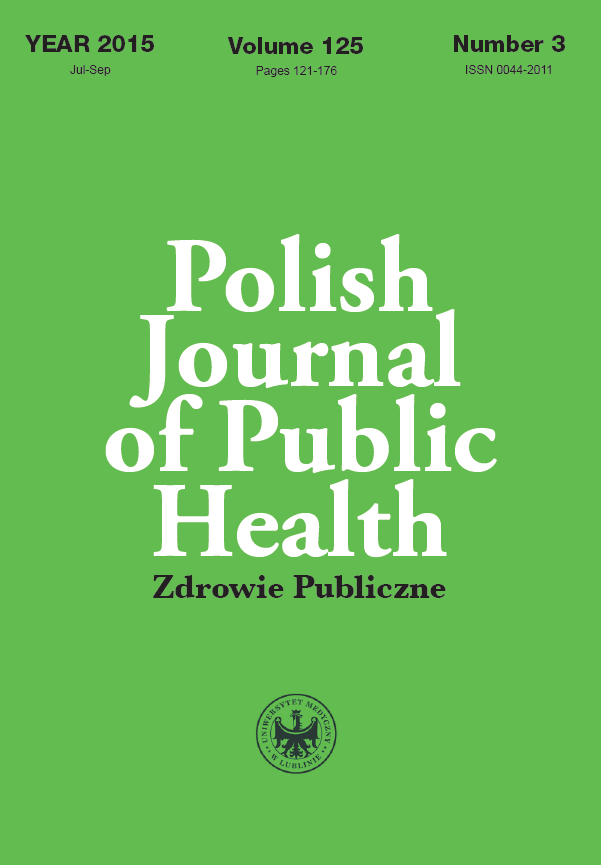The impact of medical knowledge on attitudes towards the use of OTC drugs
DOI:
https://doi.org/10.1515/pjph-2015-0041Keywords:
OTC drugs, medical knowledge, medical students, attitudes, drug abuseAbstract
Introduction. In many countries, the concept of OTC drugs, among others, is defined in advance by the assumed maximum period of their use – usually 3-5 days. In fact, many patients often benefit from these opportunities too often, use medication for longer than 3-5 days and prefer symptomatic treatment rather than causal. OTC drugs give people a sense of freedom and subjectivity. Numerous doctors claim that too much freedom in this case can prove dangerous.
Aim. The aim of this study was to analyze the changes in attitudes towards the use of OTC drugs in medicine students as they acquire knowledge and medical experience.
Material and methods. The study looked at 178 students of the Faculty of Medicine, Medical University of Lublin (89 – 1 and 2 year students as well 89 – 5 and 6 year ones). A diagnostic survey was used as a tool for obtaining responses from the participants. The survey was conducted between October 2014 and November 2014.
Results. Almost 90% of medical students use OTC drugs for self-medication, while only 11% of them have never used such medicine. Analysis of students’ attitudes indicate that acquired medical knowledge has no effect on the frequency using this type of treatment. Overall, students tend to use such drugs occasionally. Only some 14-23% of them use the OTC drugs on a regular basis. The motivations for the use such drugs include: convenience, the previous experiences implying the efficacy of drugs, less frequent are other reasons. Some 28% of the students participating in the study and at least 13% of graduating medical students accept prolonged use of OTC drugs. As the consequence acquisition of medical knowledge, the students are less likely to consult their self-medication attitudes with doctors, families and friends, more often and accurately read the leaflets for drugs, and are more and more reluctant to proposals for extending the assortment of available OTC drugs.
Conclusions. 1. Almost 90% of medical students use OTC drugs for self-treatment. 2. 28% of polled 1-2 year medical students and at least 13% of graduating ones may have tendencies to abuse drugs. 3. Over the subsequent years of study, medical students more often read medicine leaflets, they become less reliant on the advice they receive from their family or friends regarding self-treatment or they are less willing to extend the range of available OTC drugs.
References
1. U.S. Food and Drug Administration. Development & Approval Process (Drugs). Drug Applications for Over-the-Counter (OTC) Drugs. [www.fda.gov/Drugs/DevelopmentApprovalProcess/default.htm]
2. American College of Preventive Medicine. Over-the-counter medica¬tions: use in general and special populations, therapeutic errors, misuse, storage and disposal. A Resource from the American College of Preven¬tive Medicine; 2011.
3. Deloitte Center for Health Solutions. 2010 Survey of Health Care Con¬sumers: Key findings, strategic implications. [www.deloitte.com/assets/DcomUnitedStates/Local%20Assets/Documents/US_CHS_2010SurveyofHealthCareConsumers_050610.pdf]
4. Raporty podsumowujące rynek farmaceutyczny: styczeń-czerwiec 2014. Pharma Expert. 2014. [www.pharmaexpert.pl/raport-dla-mediow]
5. Kopa P. Dynamika rynku farmaceutycznego w Polsce w 2014 r. [www.biotechnologia.pl/farmacja/aktualnosci/dynamika-rynku-farmaceutycz¬nego-w-polsce-w-2014r,14472]
6. The Value of OTC Medicines to the United States. Booz & Co;2012.
7. Your Health at Hand: Perceptions of over-the-counter medicine in the United States. Strategy One for CHPA; 2010.
8. Paul A. Potential Reduction in Unnecessary Visits to Doctors from Safe and Appropriate Use of OTC Medicines Could Save Consumers and Taxpayers Billions Annually. London and Associates; 2011.
9. World Health Organization (WHO). Guidelines for Regulatory Assess¬ment of Medicinal Products for Use in Self-Medication. Geneva; 2000. [www.apps.who.int/medicinedocs/en/d/Js2218e/]
10. Brass EP. Changing the status of drugs from prescription to over-the-counter availability. N Engl J Med. 2001;345(11):810-6.
11. Curhan SG, Eavey R, Shargorodsky J, Curhan GC. Analgesic use and the risk of hearing loss in men. Am J Med. 2010;123(3):231-7.
12. Roerig JL, Steffen KJ, Mitchell JE, Zunker C. Laxative abuse. Epidemi¬ology, diagnosis, and management. Drugs. 2010;70(12):1487-503.
13. Merenstein D, Diener-West M, Halbower AC, et al. The Trial of Infant Response to Diphenhydramine. TheTIRED Study – A randomized, con¬trolled, patient-oriented trial. Arch Pediatr Adolesc Med. 2006;160:707-12.
14. Schillie SF, Shehab N, Thomas KE, Budnitz DS. Medication overdoses leading to emergency department visits amongchildren. Am J Prev Med. 2009;37:181-7.
15. Wilcox CM, Cryer B, Triadafilopoulos G. Patterns of use and public perception of over-the-counter pain relievers: Focus on nonsteroidal an¬tiinflammatory drugs. J Rheumatol. 2005;32:2218-24.
16. Attorney General Consumer and Prescriber Education Grant Program. ConsumerReports.org. [www.consumerreports.org/cro/2012/05/10-over-the-counter-drugs-to-avoid-during-pregnancy/index.htm]
17. Vernacchio L, Kelly JP, Kaufman DW, Mitchell AA. Medication use among children <12 years of age in the United States:Results from the Slone Survey. Pediatrics. 2009;124:446-54.
18. DrugFacts. Prescription and Over-the-Counter Medications. National Institute on Drug Abuse. Revised December 2014. [www.drugabuse.gov/publications/drugfacts/prescription-over-counter-medications]
19. Substance Abuse and Mental Health Services Administration (SAMH¬SA). National survey of drug use and health. Rockville, Md: Office of Applied Studies; 2005. [www.oas.samhsa.gov/2k8/cough/cough.cfm]
20. Johnston LD, O’Malley PM, Bachman JG, Schulenberg JE. Monitoring the Future National Survey Results on Drug Use, 1975-2008. Volume I: Secondary School Students. Bethesda, Md: National Institute on Drug Abuse; 2009.
21. Bryson EO, Silverstein JH. Addiction and Substance Abuse in Anesthe¬siology. Anesthesiol. 2008;109(5):905-7.
22. Kumar P, Basu D. Substance abuse by medical students and doctors. J Indian Med Assoc. 2000;98(8):447-52.
23. Parikh D, Sattigeri BM, Kumar A, Brahmbhatt S. A survey study on use of over the counter (OTC) drugs among medical students, nursing and clerical staff of a tertiary care teaching rural hospital. Int J Res Med Sci. 2013;1(2):83-6.
24. Almalaka H, Albluwia AI, Alkhelba DA, et al. Students’ attitude toward use of over the counter medicines during exams in Saudi Arabia. SPJ. 2014;22(2):107-12.
25. Shivaraj BP, Vardhamane SH, Patil BV, et al. Self-Medication Practice and Perceptions Among Undergraduate Medical Students: A Cross-Sec¬tional Study. J Clin Diagn Res. 2014;8(12): HC20-HC23.
Downloads
Published
Issue
Section
License
Copyright (c) 2015 Polish Journal of Public Health

This work is licensed under a Creative Commons Attribution-NonCommercial-NoDerivatives 3.0 Unported License.


